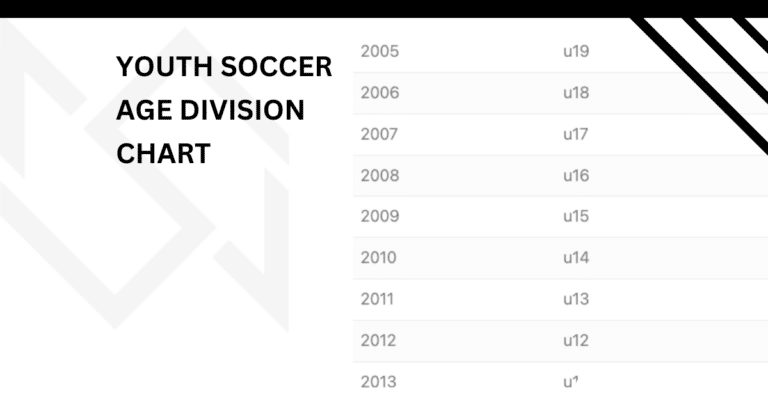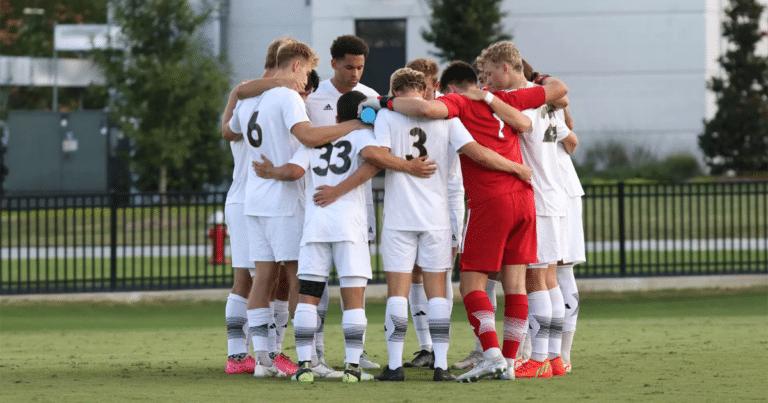Good Sportsmanship in Soccer: Importance and Examples
Good sportsmanship should be part of all sports. Specifically in youth sports, it promotes a positive environment for players, coaches, parents, and referees.
When players exhibit good sportsmanship, they show respect for the game, their opponents, and the officials. At the end of the day, it pays off to be nice in soccer.

As a soccer player, it’s important to understand that good sportsmanship goes beyond just following the rules. It’s about being respectful to everyone involved in the game and showing integrity, honesty, and fairness.
Sportsmanship comes in many different flavors. On one hand, I’ve seen good kids congratulate their opponents after they score because it was a nice play. On the other hand, I’ve seen a parent and child try to fight their opponents and parents.
In this article, we will discuss the importance of good sportsmanship in soccer and provide tips on how to demonstrate it on and off the field.
Understanding Good Sportsmanship in Soccer
Good sportsmanship means treating others with respect, playing fairly, and following the rules of the game. It also means accepting the outcome of the game, whether you win or lose.
In youth soccer, good sportsmanship starts with the players. As a player, you need to respect your opponents, teammates, and referees.
This means not using foul language, not arguing with the referee, and not intentionally injuring other players.
As a coach, you play an important role in promoting good sportsmanship. You should encourage your players to play fairly and respect their opponents.
You should also lead by example and show good sportsmanship yourself. This means not yelling, not berating your players in public, and not encouraging your players to take cheap shots.
Parents also have a significant role in promoting good sportsmanship. As a parent of a youth soccer player, you should support your team, but you should also respect the opposing team and its fans. This means not using foul language and not engaging in any other disruptive behavior.
The Importance of Good Sportsmanship in Soccer
When the game is played with good sportsmanship all around, it’s a better experience for everyone involved.
Here are a few reasons why good sportsmanship is so important in soccer:
1. Promotes Fair Play
Good sportsmanship promotes fair play, which is a fundamental principle of soccer. When players respect each other and play by the rules, the game is fair and enjoyable for everyone.
It also helps prevent injuries and dangerous plays that can occur when players are not playing fairly.
2. Builds Positive Team Culture
Soccer is a team sport, and good sportsmanship helps build a positive team culture.
When players are respectful and supportive of each other, they work together better as a team and are more likely to succeed.
Good sportsmanship also helps build trust and camaraderie among teammates, which is essential for a successful team.
3. Encourages Respect for Opponents
When players respect their opponents, they are less likely to engage in unsportsmanlike behavior, such as trash-talking or aggressive play.
It also helps players develop empathy and understanding for their opponents, which can lead to better sportsmanship and a more enjoyable game for everyone.
4. Sets a Positive Example
Good sportsmanship sets a positive example for others, especially young players. When players, coaches, and parents model good sportsmanship, they teach others how to behave respectfully and responsibly. It also helps create a positive soccer culture that values fair play and respect for others.
Exemplifying Good Sportsmanship
Good sportsmanship makes the game enjoyable for everyone involved, including players, coaches, and referees. Here are some ways you can exemplify good sportsmanship in soccer.

Respect for Opponents
Respecting your opponents is an essential part of good sportsmanship. It means treating them with kindness and fairness, whether you win or lose. Here are some ways to show respect for your opponents:
- Shake hands after the game
- Avoid trash-talking or taunting
- Help an opposing player who is injured
- Congratulate them on a good play or game
Respect for Officials
Respecting officials is another crucial aspect of good sportsmanship. It means treating them with respect and understanding that they are doing their best to make fair calls. Here are some ways to show respect for officials:
- Avoid arguing or complaining about calls
- Accept their decisions without protest
- Thank them for their time and effort
- Don’t roll your eyes at them
Playing Fair
Playing fair means following the rules and playing to the best of your ability without cheating or taking intentional shortcuts. Here are some ways to play fair:
- Avoid fouls or other illegal plays
- Play with honesty and integrity
- Avoid diving or exaggerating injuries
- Admit and accept when you make a mistake or commit a silly foul
The Role of Soccer Coaches in Promoting Good Sportsmanship
As a soccer coach, your actions and words can have a significant impact on the team’s behavior on and off the field. Here are some ways you can promote good sportsmanship:
Lead by Example
As a coach, you are a role model for your players. You must demonstrate good sportsmanship and composure yourself if you want your players to follow suit. This means showing respect for the opposing team, the referees, and your own players.
Avoid yelling at the referees or engaging in arguments with the opposing team’s coach. Honestly, this is petty behavior and should not be part of the game. Instead, focus on supporting your players and encouraging them to play their best.
Set Expectations
Make it clear to your players that good sportsmanship is a priority for your team. Explain what you expect from them in terms of behavior and attitude.
Encourage them to support each other, respect their opponents, and play fairly. You can even create a code of conduct that outlines your team’s expectations for sportsmanship.
Address Poor Behavior
If you notice a player engaging in poor sportsmanship, it’s essential to address it immediately. Talk to the player in private and explain why their behavior is unacceptable.
Encourage them to apologize if necessary and make amends. If the behavior continues, consider benching the player or taking other disciplinary action.
Teach Respectful Competition
Good sportsmanship means playing to win but doing so in a respectful way. Teach your players to compete fairly and avoid unsportsmanlike behavior such as taunting, trash-talking, or excessive celebration.
Encourage them to congratulate their opponents after the game, win or lose.
Celebrate Good Sportsmanship
Finally, make sure to celebrate good sportsmanship when you see it. Praise players who demonstrate respectful behavior on and off the field.
Consider giving out awards or recognition for good sportsmanship at the end of the season.
By highlighting positive behavior, you can encourage your players to continue to strive for good sportsmanship.
The Role of Parents in Encouraging Good Sportsmanship
As a parent of a young soccer player, you play a crucial role in shaping your child’s attitude towards sportsmanship. Your child looks up to you for guidance and support, and it’s important that you model good sportsmanship behavior both on and off the field.
- Lead by example: Your child learns from your behavior, so it’s important that you model good sportsmanship at all times. Avoid shouting at the referees or other parents, and instead focus on cheering for your child and their team. Also, never talk bad about another player on the team. Kids will pick up on it.
- Teach the rules: Make sure your child understands the rules of the game and the importance of following them. Encourage them to play fair and avoid cheating or unsportsmanlike behavior. Remind them that winning isn’t everything, and that playing the game with integrity and respect is just as important.
- Encourage teamwork: Emphasize the importance of teamwork and encourage your child to support their teammates. Remind them that everyone has a role to play on the team, and that success comes from working together.
- Celebrate effort, not just results: While winning is important, it’s also important to celebrate your child’s effort and hard work, regardless of the outcome of the game. Encourage them to keep trying and to learn from their mistakes, rather than focusing solely on the final score.
- Be a positive influence: Finally, be a positive influence in your child’s life. Encourage them to be kind, respectful, and empathetic towards others, both on and off the field. Help them understand that good sportsmanship is about more than just winning or losing – it’s about treating others with dignity and respect, and always doing your best.
The Long-Term Benefits of Good Sportsmanship in Soccer
Good sportsmanship has long-term benefits that can positively impact your life both on and off the field. Here are some of the benefits of good sportsmanship in soccer:
1. Builds Character
Playing soccer with good sportsmanship helps you develop a strong character. It teaches you to be humble in victory and gracious in defeat.
When you show respect for your opponents and the rules of the game, you demonstrate integrity and build a reputation as a fair player.
2. Improves Relationships
Good sportsmanship in soccer can help you build positive relationships with your teammates, opponents, coaches, and referees.
When you show respect for others and treat them the way you want to be treated, you create a positive and inclusive atmosphere that fosters teamwork and camaraderie.
At the same time, poor sportsmanship can ruin relationships very quickly.
3. Enhances Mental Toughness
Playing soccer with good sportsmanship can help you develop mental toughness.
When you face challenges and setbacks, you learn to stay focused and resilient. You also learn to control your emotions and maintain composure in high-pressure situations.
4. Boosts Self-Esteem
Being a good person on and off the field will make you feel good about yourself.
You know that you are playing the game the right way and that you are respected by your peers. This sense of self-esteem can carry over into other areas of your life and help you achieve your goals.
Conclusion
Good sportsmanship goes a long way. It allows you to build friendships, feel good inside, and enjoy the game that you love playing more.
When poor sportsmanship is involved in soccer, the game gets chaotic. For example, I’ve personally witnessed parents yell at the ref all game. Eventually, the players feed off it and they start yelling. This creates a hostile environment for everyone involved. What’s worse? This is a game full of 9 year-olds!
Remember, soccer is just a game. Refs are doing their best. Today’s game won’t matter tomorrow. Enjoy everything about it while you are still playing or watching.
Oh, and just be nice. It will take you far in life.
Frequently Asked Questions
How can players demonstrate good sportsmanship in soccer?
Why is good sportsmanship important in soccer?
What are some examples of good sportsmanship in soccer?
What are the consequences of bad sportsmanship in soccer?

Written By: SoccerNovo
SoccerNovo is an independent youth soccer media brand built to help parents, players, and coaches better understand the game and the pathways available in U.S. soccer. Our mission is to make youth soccer simpler, clearer, and more accessible for everyone involved in it.
Let’s connect







